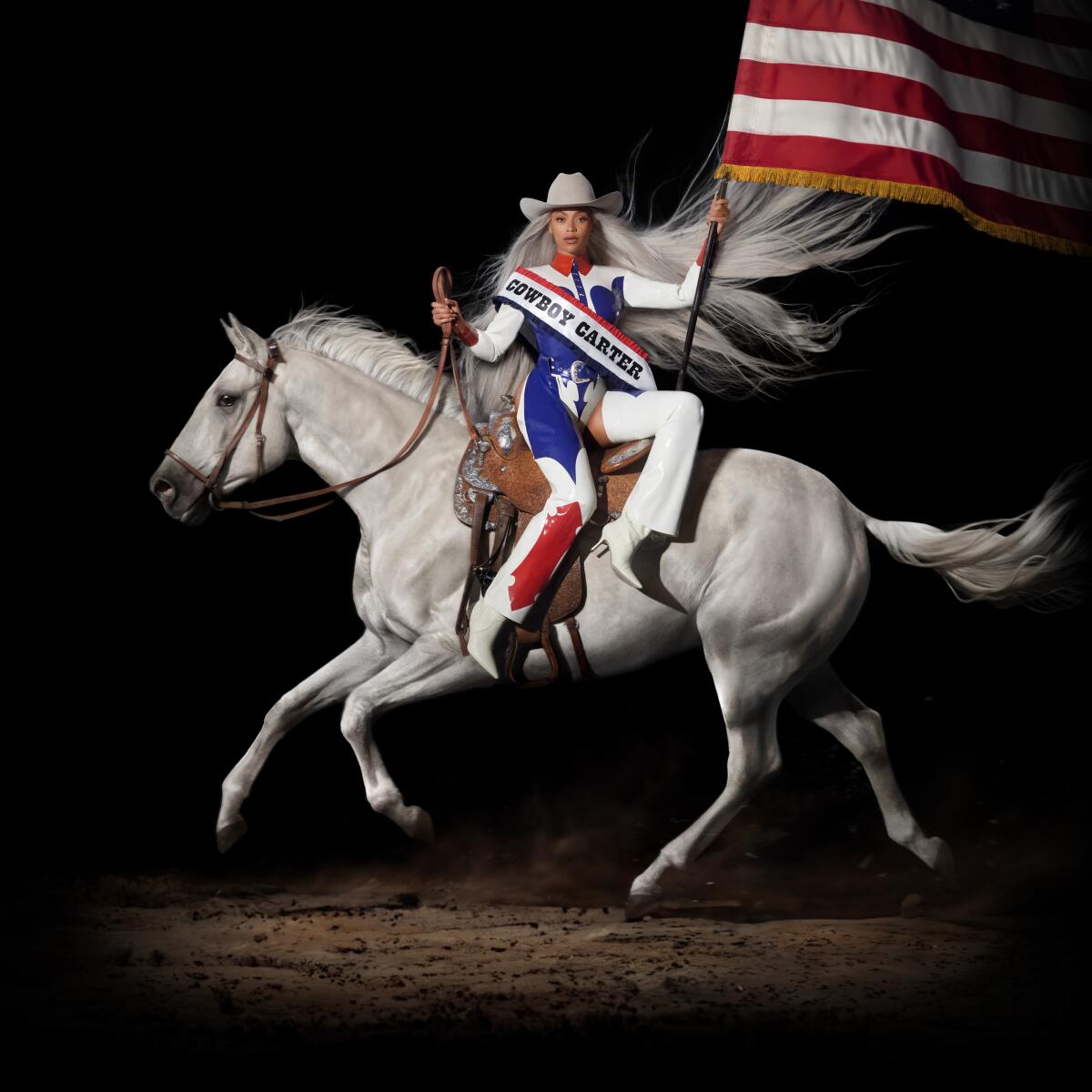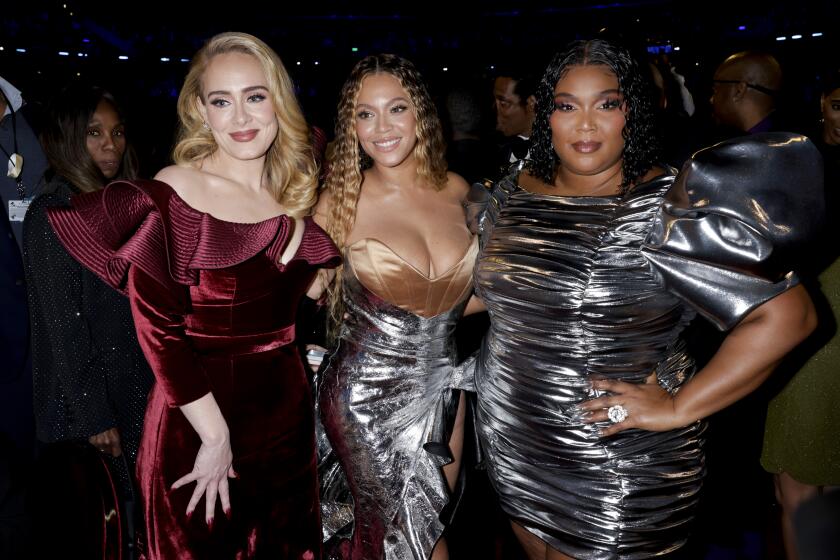The power of Beyoncé’s ‘Cowboy Carter’ isn’t its country twang. It’s her imagination, unlocked

- Share via
A costume, an accent, a narrative mode, a homecoming: For Beyoncé, country music is all that (and more) on “Cowboy Carter,” the pop superstar’s boot-scooting blowout of a new studio album. It’s as sprawling and as rigorous as we’ve come to expect from the most intellectually ambitious artist in music; it also can make you wonder — and this of course is easy for me to say — whether Beyoncé should stop seeking the approval of those who’ve shown themselves unworthy of bestowing it.
Determined as always to introduce her work on her own terms, Beyoncé wrote on Instagram before the LP’s release on Friday that “Cowboy Carter” was “born out of an experience that I had years ago where I did not feel welcomed” — a reference, presumably, to the racist backlash that greeted her performance of her song “Daddy Lessons” with the Dixie Chicks at the 2016 Country Music Assn. Awards. The episode led her to immerse herself in the “rich musical archive” of country music’s undersung Black pioneers, just as she’d studied the Black and queer roots of dance music to make 2022’s “Renaissance.” (“Renaissance” and “Cowboy Carter” are billed as the first and second acts in a proposed trilogy, though Beyoncé’s reign as pop’s foremost musicologist really began with the tribute to HBCU tradition she brought to Coachella in 2018.)

As a proud Houston native — “the grandbaby of a moonshine man,” as she puts it in the new album’s opener, “Ameriican Requiem” — Beyoncé’s connection to country music runs deep: “Got folk down Galveston, rooted in Louisiana,” she sings in “Ameriican Requiem,” a surging march layered with guitar, sitar and the hum of an electric church organ. “Used to say I spoke too country / Then the rejection came, said I wasn’t country ’nough.” The same went for “Renaissance,” whose excursions into house, disco and ballroom music she linked to her close relationship with a gay family member named Uncle Johnny.
And, indeed, it’s the particulars of Beyoncé’s identity that give her music much of its cultural weight — that position her here as a Black woman endeavoring to make space for people of color in a field that’s long proved inhospitable to anyone other than straight white men. Already she’s been criticized by some on social media for doing less than she could in that regard on a record that prominently features Miley Cyrus and Post Malone while it convenes four Black female country singers — Tanner Adell, Brittney Spencer, Tiera Kennedy and Reyna Roberts — to serve as her backing chorus in a moving cover of the Beatles’ “Blackbird.” Other guests include Shaboozey and Willie Jones, both country-rap fusionists, and the country elders Willie Nelson, Dolly Parton and Linda Martell, all of whom provide spoken interludes.
Racism, sexism, fuddy-duddyism: They’re all reasons why the winningest artist in Grammy history lost album of the year yet again, this time to Harry Styles.
Yet it’s the pop star’s prerogative to borrow freely from whatever and wherever she likes; the determinist thinking around Beyoncé can downplay pop’s true promise, which is that one’s talent and ingenuity are all the license one needs. Certainly, that freedom is enjoyed more readily by the likes of Malone (whose presence on November’s CMA Awards appeared to rankle nobody) and Morgan Wallen (who’s done as much as any country act to import elements of Black creativity into a putatively white genre — always a more frictionless process than the reverse). But the most thrilling moments on “Cowboy Carter” aren’t feats of reclamation so much as achievements of invention: hard-to-classify songs such as “Sweet Honey Buckiin’,” in which Beyoncé croons Patsy Cline’s “I Fall to Pieces” over a thumping Jersey club groove, or “II Hands II Heaven,” a celestial trance-folk fantasia that evokes a long night in the desert.
As a grand statement on America — the kind the album’s cover sets you up for with its striking stars-and-bars symbology — “Cowboy Carter” feels a bit mushy. Beyoncé sings in “Ameriican Requiem” about “a pretty house that we never settled in” and notes in “Ya Ya” that there’s “a whole lot of red in that white and blue”; the latter tune, which quotes Nancy Sinatra and the Beach Boys and summons memories of Tina Turner, also lamely addresses the anxieties of people exhausted from “working time and a half for half the pay”: “We gotta keep the faith,” Beyoncé advises. Oh, is that all?

She’s said that each song was conceived in response to a specific Western film (among them “Urban Cowboy” and “The Hateful Eight”), which means they might be less strictly autobiographical than Beyoncé has trained us with LPs like “Lemonade” to assume. The breezy “II Most Wanted,” for instance — with Beyoncé and Cyrus harmonizing about smoking cigarettes while “flying down the 405” — may well be a riff on “Thelma & Louise.” (Two highly personal exceptions are the stately “16 Carriages,” about the youth she spent building a career on the road, and “Protector,” a tender acoustic ballad in which she describes the bond between mother and child — and which starts with Beyoncé’s daughter Rumi asking her mom for a lullaby.)
Yet that slightly gimmicky storytelling approach seems to have unlocked her imagination; it’s gratifying to hear her lean not just into country music’s history but into its wit and style and pageantry. “Levii’s Jeans” — all these double i’s are evidently meant to reinforce “Cowboy Carter’s” Act II status — is a sexed-up duet with her and Malone trading cheeky lines about the charms of hip-hugging denim; “Riiverdance” blends programmed beats and a speedy finger-picked guitar lick like nothing since Rednex scored a left-field hit with “Cotton Eye Joe” in 1995. Her singing is just as vivid and varied across the LP, with gutsy growls and breathy trills against multi-tracked harmony vocals that approximate the heavenly abundance of a gospel choir.

Like “Renaissance,” “Cowboy Carter” reflects the great care Beyoncé takes in structuring her albums: Witness the way she moves from “Bodyguard,” a ’70s-style soft-rock jam, to an interlude by Parton, whose “I Will Always Love You” was covered by Whitney Houston in “The Bodyguard,” to a rendition of Parton’s “Jolene,” in which Beyoncé remakes the original lyric as a bare-knuckle threat, to “Daughter,” a stark murder ballad that explores a family’s legacy of violence.
That belief in the potential of the album format is one reason that Beyoncé’s tortured past at the Grammy Awards, where she’s lost album of the year four times, remains such a vexing part of her story up there with the CMAs incident that set “Cowboy Carter” into motion. Still, it’s hard not to cringe when she evidently refers to her most recent defeat in album of the year — AOTY for short — with the eminently deserving “Renaissance.” “A-O-T-Y, I ain’t win / I ain’t stuntin’ ’bout them,” she raps in “Sweet Honey Buckiin’,” “Take that s— on the chin / Come back and f— up the pen.”
Beyoncé used that motivation to deliver the fascinating “Cowboy Carter.” But no gatekeeper can take credit for her vision.
More to Read
The biggest entertainment stories
Get our big stories about Hollywood, film, television, music, arts, culture and more right in your inbox as soon as they publish.
You may occasionally receive promotional content from the Los Angeles Times.








